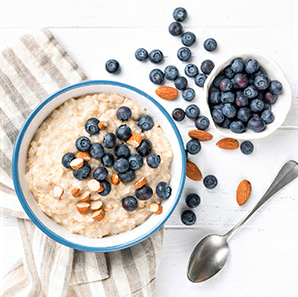5 Expert Tips for Getting Your Diet Back on Track

1. Focus on Adding (Versus Removing)
For many, overhauling our diets means making drastic cuts to either how much we eat or even entire food groups. This deprivation mindset can be very self-defeating both physically and mentally. Not only do our bodies need a wide variety of nourishing foods, but our minds begin to protest the minute we set strict boundaries. Telling yourself, "You're not allowed X" can unintentionally encourage you to focus solely on that very food or food group! Even worse, you may be tempted to binge on the food when you do eat it.
Instead, spend a few days writing down or tracking what you have been eating. Then assess the following:
- Am I getting enough protein at each meal? (.35 x your weight in pounds = your daily recommended protein in grams)
- Am I consuming 5+ servings of vegetables and fruit each day?
- Am I drinking enough water? (dehydration can lead to snacking)
- Am I eating the recommended amount of fiber each day? (25 grams for women and 38 for men)
- Am I including 1-2 thumb-sized portions of healthy fats?
Your observations can help you rethink your meals without necessarily banning certain foods. But shouldn't you eliminate certain foods? It depends. Unless you have diabetes or pre-diabetes, consider taking it slow for a while. Here's an example:
Meal Observation 1: My breakfasts tend to be low in protein and veggies.
Add: A side of egg whites to your usual bagel or top your oatmeal with a handful of almonds.

Add: A serving of broccoli to your plate or throw a handful or two of spinach in your smoothie.
Meal Observation 2: I'm not consuming enough fiber at each meal.
Add: Some fruit like an apple, pear, or berries to your breakfast, lunch, or snack.
Add: Split pea or lentil soup to your lunch lineup or snack on pistachios or carrots in the afternoon or while meal-prepping.
You may be thinking, "If I add food to my plate, won't I eat more?" Not necessarily, especially as your body grows accustomed to a more balanced meal. You might find yourself eating just half of that morning bagel – or your smoothie may be so filling that you no longer need a mid-morning snack. One of the many perks of adding nourishing foods that your body needs, and will even come to crave in time, is eating more balanced meals that fill you more quickly and sustain you longer. In the long run? You'll likely eat less if you've been eating too much.
2. Set Reasonable and Achievable Goals
What is it about starting new diets that tempts us to set such lofty goals? The truth is, real – and lasting change – takes time.
The minute you find yourself settling for a pre-determined number (like the one on the scale), ask yourself these questions:
- Is this really doable in a healthy way?
- How will I react if I don't reach this goal? Will I be tempted to give up?
- Am I being kind to myself with this expectation?

Instead of focusing on the usual (like weight loss), consider the many other benefits you'll start to gain almost immediately: more energy, less bloating, and better sleep. Your other goals will come in time. If you enjoy tracking numbers, consider the following markers:
- How many days this week did you meet your daily step or activity goals?
- Did your blood sugar, cholesterol, or blood pressure go down?
- Do you feel better?
“Remember that perfection is an illusion,” shares registered dietitian and Munson Medical Center Community Health Coordinator, Tara Rybicki. “Aim for a realistic and sustainable goal. Prioritizing your own self-care is not only okay but necessary for well-being.”
3. Downplay Sugar
Have you ever spent time reading the food labels as you shop? The amount of added sugar (like high fructose corn syrup) can be pretty shocking, and it's seemingly in everything from condiments like ketchup to everyday staples like dressings, flavored yogurt – and even some meats! In short, you may be consuming the same amount of sugar as your favorite sweet treats. On average, men consume approximately 24 teaspoons of added sugar per day, or what's equivalent to 384 calories, according to the National Cancer Institute.
Focusing on whole foods can also help you eliminate the sneakier sugar you may not even realize you're eating, so you can indulge in a sweet treat from time to time. Check out the tips below to learn more about healthy swaps.
4. Make Smart Swaps

Food swaps are a simple and healthy way to get back on track, feel better, and reach your health goals by nourishing your body with essential macro and micronutrients so it can thrive, and in turn, feel satiated.
Here are some ideas to get started. Bonus: Many of these swaps will naturally increase your fiber intake!
- Crackers and Chips: Roasted or air-fried potatoes; Kale chips; Carrot sticks with nut butter; Fresh fruit with a side of yogurt; Air-popped popcorn
- White bread: Whole grain bread with added seeds (aka fiber); Fresh green lettuce wraps; Oats or quinoa
- Side of Noodles or White Rice: Potatoes; Squash; Farro; Brown rice; Barley
- Milk Chocolate: Dark chocolate
- Sugary store-bought treat: Homemade treat, subbing sugar with stevia or monk fruit sugar (or reduce sugar by half)
- White flour: Ground oats; Cassava flour; Almond flour; Coconut flour; Whole wheat flour; Cauliflower
- Regular sauces/dressings/high-calorie dips: Olive oil and vinegar; Low sodium sauces; Hummus; Salsa; Homemade dips made with plain (Greek provides extra protein) or non-dairy yogurt.
5. A Healthy Diet Stays in the Kitchen
You've probably heard the phrase, "You can't outrun a bad diet." Daily movement is great for your body and sense of well-being and comes with numerous benefits, but workouts can quickly play a large role in our food "noise." For example, if you've ever enjoyed and even overindulged on sweets, snacks, or rich meals because you've "earned it" through a workout, you've made exercise a justification to eat, rather than for its true value. Moreover, this mindset encourages us to label certain foods as "bad,” when in fact a treat should be enjoyed without preconditions.

If you know you struggle with these thoughts, it's important to shift your movement mindset. Rather than viewing exercise as a means to an end (eating non-nourishing food), focus on the benefits it brings to your body and well-being. As you do so, movement will become an enjoyable part of your life that has no relationship to food. In turn, you'll be free to focus on the value of the foods you eat and the nourishment they provide you, rather than running calculations through your head to determine how much you get to eat.
When Was Your Last Checkup? Do You Know Your Health Numbers?
Contact your PCP to schedule your annual exam or routine screening. If you don’t have a medical home, call Munson Healthcare's Ask-A-Nurse line at 231-935-0951. Our team will help you find a physician nearby.
You can also use our Find-a-Doctor tool to search for a doctor near you.